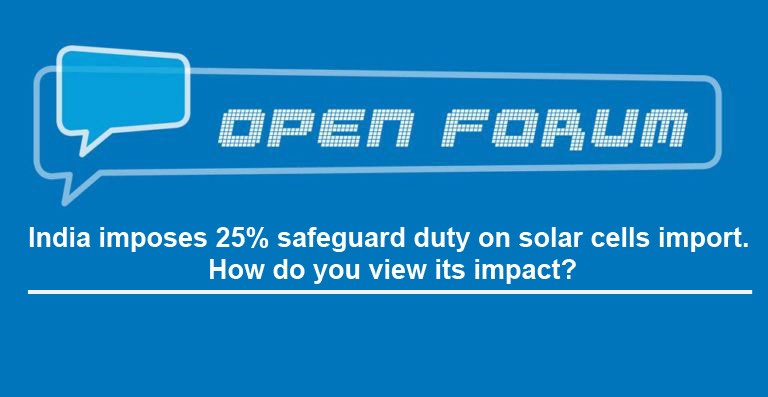India imposes 25% safeguard duty on solar cells import. How do you view its impact?
By EPR Magazine Editorial September 10, 2018 6:48 pm IST
By EPR Magazine Editorial September 10, 2018 6:48 pm IST


This is a step taken too early without enhancing and upgrading the entire solar power ecosystem. The immediate effect could be easily seen on 10 GW+ projects which are either in the execution phase or at a very advanced stage of commissioning. The duty has seriously put in question the 100 GW targeted NSM plans set to achieve by 2022. The duty shall increase the capital cost for a solar power project by approximately 15 per cent which in turn would result in an increase in tariff by 10-15 per cent per unit to maintain a similar level of returns for project developers. Power distribution companies would shy away from buying tariffs at these high levels. An increase in capital costs means solar will become less competitive as compared to other sources of power.
The imposition of safeguard duty on imported solar cells and modules could improve the competitiveness of domestic module manufacturers but the key point which has been missed out is the lack of backward integration in the solar manufacturing with absolutely no functional unit of polysilicon and wafers. These factors along with the ‘not so clear’ policies are not going to attract investments in the manufacturing field in the near future. Moreover, for all other major components in module manufacturing, the major dependency remains on imports from China. The penetration has just started in the power consumption through solar energy but this untimely move would act as a deterrent in the execution of solar projects.

Well, it would adversely impact the commercial viability of some solar power projects and will lead to a boom in the solar tariff. Higher tariff will make solar power less competitive, hampering the country’s capacity addition plans.
The bottom line of this kind of protected duty is that, while it seems to make domestic manufacturers happy, it has the potential to leave others in the value chain, unhappy. The implementation of the safeguard duty appears one sided, with no certain value for any participants involved.

Certainly not. To whom are we safeguarding? This duty would raise costs, delay solar capacity building and make it impossible to achieve 100 GW solar target by 2022. Current year auction would be 20-25 GW and domestic manufacturers are not in a position to manufacture over 3-4 GW. So, there is no chance in near future to replace import by domestic players. Domestic cell players are anyways going to import wafers and If they are given safeguard duty protection, then wafer suppliers might increase the prices. Ultimately, this rise in cost would be passed on to the buyers. There would be a rise in solar tariffs and hence DISCOM and end users would not be happy. Instead Government should incentivise domestic manufacturers for safeguarding everyone’s interest of promoting solar business.

However, since imposed duty applies only to developed countries, China and Malaysia, the authorities need to be vigilant towards imports from other developing countries. If we fail to monitor such movements, history will repeat itself, with India becoming a dumping nation for solar equipment, only from a different source. Moreover, with the growth in demand and economies of scale, it is imperative to protect the interest of domestic manufactures. Having said that, as the largest solar manufacturer in the country, we are happy to be an active partner and contribute towards the solar growth in India.

According to me, the move is a double-edged sword. Imported solar cells have proven to be much more efficient in terms of output generation. Most of the major module manufacturers rely heavily on imported solar cells for their modules. Imposing this duty would obviously lead to costlier modules and this affects the cost of an overall system.
However, in this move of empowering the local manufacturers, the centre itself will end up being on the receiving end of the sword. The residential sector has an extremely large potential to achieve the 100GW target provided the government keeps up the subsidy initiative. The only thing that holds them back from investing into solar is the high up-front costs associated with it. However, with the increase of prices of reliable modules, this sector is only going to end up being untapped of its potential.

Imposing a 25 per cent Safeguard duty on solar cell from China and Malaysia, will lead to mitigation of serious injury to the domestic industry. It would improve viability of the upstream and downstream industry associated in the base chain of the manufacturing of solar cell/module. It is welcome move in long term perspective.
Actual cause of injury to the domestic industry is aggressive pricing practices of other Indian producers and not imports, because in public interest perspective, it may not be the most economical thing to do. The capital cost for projects could increase by much as 15-20 per cent. It would also increase tariffs by about Rs. 0.20-0.30 a unit. It also affects the national solar mission including India’s target of 100 GW of solar power development by 2022 as the tariffs increase.
Ultimately, it will prevent complete erosion of manufacturing base of solar industry in the country which is upcoming and holds the promise for a stronger manufacturing base in the country in future concerns.
We use cookies to personalize your experience. By continuing to visit this website you agree to our Terms & Conditions, Privacy Policy and Cookie Policy.